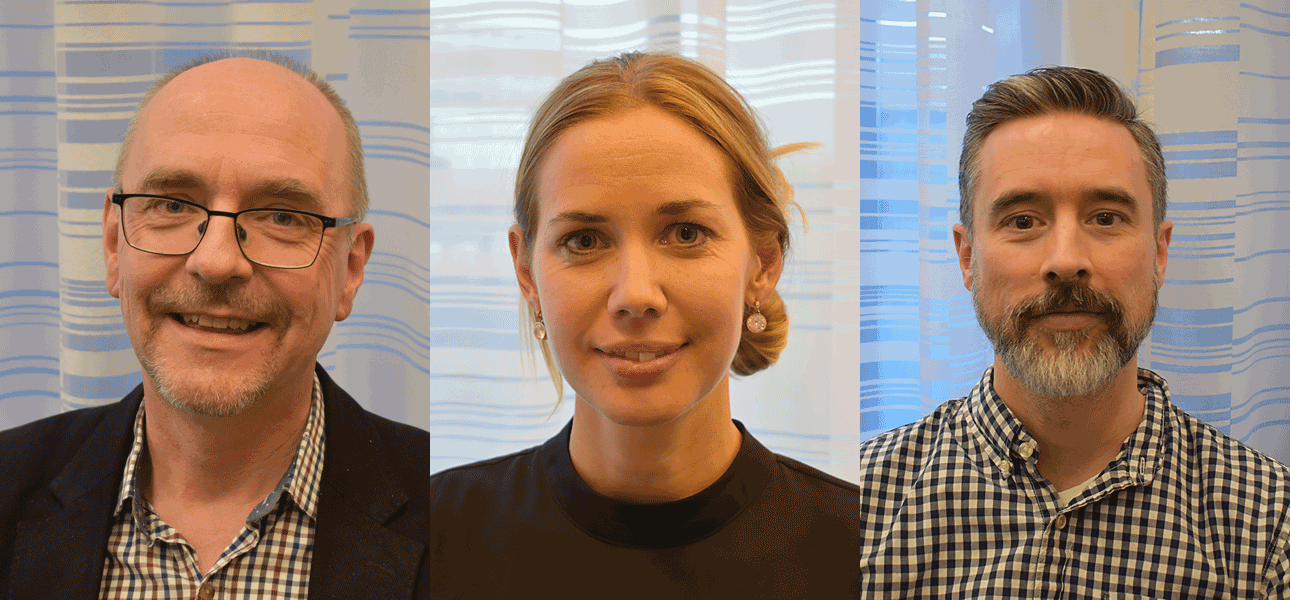News
News
PublISHED ON
UpDATED ON
ERC grants offer great freedom
In 2019, a total of 30 researchers in Sweden received grants from the ERC under the calls for Starting Grant, Consolidator Grant and Synergy Grant. A further six researchers were awarded funds under the call for Advanced Grant 2018. We have spoken to three researchers who received ERC grants.
“These researchers have received grants in very stiff competition from other researchers around Europe,” says Lena Renner, the ERC’s national contact point at the Swedish Research Council.
The researchers work in humanities and social sciences, natural and engineering sciences, and medicine and health sciences. The research funds will last for around five years.
Long-term and good basic funding
One of the persons awarded an Advanced Grant is Anders Rantzer at Lund University. He is studying algorithms that contribute to making control engineering more flexible. Control engineering links together district heating, electricity networks, and traffic flows as well as other infrastructure in cities.
“The grant means such a lot. I have now been able to build up a solid research team, which gives me great freedom, at the same time as we have long-term and good basic funding in the project,” he says.
Sara Liin at Linköping University was awarded a Starting Grant to study how specialised proteins are crucial for heart rhythm and nervous system impulses. For her, the grant means she can carry out research into exactly what she wants, without limitations.
“Where the ERC grants differ from many other research grants is that you apply with a concept that you have worked out yourself. Something that you are really enthusiastic about, and perhaps, as for me, is a dream come true to realise,” she says.

Anders Rantzer, Lund University, Sara Liin, Linköping University and Bob Sturm, KTH.
Sara Liin describes the application process as time-consuming, but at the same time interesting and educational. So does Bob Sturm, who conducts research at KTH Royal Institute of Technology and was awarded a Consolidator Grant. The interview was particularly challenging, he thinks.
Bob Sturm is researching how computers and AI, artificial intelligence, can create music. He has created an artificial model based on machine learning, which repeats and produces new notes from music being played. The grant from the ERC means that he can conduct research freely for five years in an area that has been little studied in relative terms.
Interview training for future ERC candidates
The application process for the ERC calls has two stages. Around 30 per cent of the written applications received by the ERC are selected for the second stage. In the second stage, the applicants are interviewed by expert panels in Brussels.
The Swedish Research Council works to encourage more Swedish researchers to apply for and be awarded ERC grants. For this reason, Lena Renner from the Swedish Research Council is visiting higher education institutions to inform about the grants. Training is also arranged for those selected for the interview stage. The interview training for this year’s call will be held later this spring and in August.
Researhers in Sweden i Sverige who received grants from the ERC 2019
Starting Grant
- Jenny Mjösberg, Karolinska Institutet
- Maria Genander, Karolinska Institutet
- Pia Dosenovic, Karolinska Institutet
- Nancy Bocken, Lund University
- Per Augustsson, Lund University
- Mikkel Brydegaard, Lund University
- Andreas Ehn, Lund University
- Maria Cuartero, KTH Royal Institute of Technology
- Outi Tammisola, KTH Royal Institute of Technology
- Sara Liin, Linköping University
- David Wheatcroft, Uppsala University
- Davide Angeletti, University of Gothenburg
- Markus Kowalewski, Stockholm University
- Karin Lind, Stockholm University
The Starting Grant is intended for researchers awarded a doctoral degree 2–7 years ago.
Consolidator Grant
- Åsa Haglund, Chalmers University of Technology
- Fredrik Westerlund, Chalmers University of Technology
- Ilona Riipinen, Stockholm University
- Camilla Svensson, Karolinska Institutet
- Myriam Aouadi, Karolinska Institutet
- Anders Rosengren, University of Gothenburg
- Paul Kardol, SLU Swedish University of Agricultural Sciences
- Bob Sturm, KTH Royal Institute of Technology
- Dimos Dimarogonas, KTH Royal Institute of Technology
- Filipe Pereira, Lund University
The Consolidator Grant is intended for researchers awarded a doctoral degree 7–12 years ago.
Synergy Grant
- Susanne Schlisio, Karolinska Institutet
- Igor Adameyko, Karolinska Institutet
- Mikael Rydén, Karolinska Institutet
- Olle Eriksson, Uppsala University
- Tomas Roslin, SLU Swedish University of Agricultural Sciences
- Martin Leijnse, Lund University
The Synergy Grant is aimed at research teams with 2–4 researchers taking on a joint research project.
Advanced Grant (2018)
- Johan Åkerman, University of Gothenburg
- Yi Wang, Uppsala University
- Per-Olof Berggren, Karolinska Institutet
- Magnus Berggren, Linköping University
- Daniel Conley, Lund University
- Anders Rantzer, Lund University
The Advanced Grant is aimed at established researchers.
MORE WITHIN THE SAME SUBJECT AREA
-
News |
Published 11 April 2024
The ERC has published the results of last years call for ERC Advanced Grant. 255 researchers from 20 different countries are awarded the grant. 10 of them are affiliated to a Swedish host institution.
-
Activity |
Published 20 March 2024
The Swedish Research Council is organising a workshop series for European Research Council (ERC) Starting Grant step 2 candidates to obtain advice and inspiration for the interview with the ERC panel. Target group is Reseachers that have applied with...
-
Activity |
Published 5 February 2024
Welcome to an information webinar about the next call for ERC Starting Grant (ERC-2025-StG) and ERC Consolidator Grant (ERC-2025-CoG). The meeting is aimed at researchers and administrative staff at Swedish universities who work with research support...




